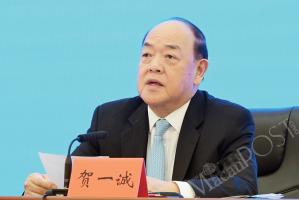2021-09-15 03:35 Comment:0
Tony Wong
The government is launching a 45-day public consultation today on proposed amendments to the city’s current gaming industry law, which proposes to ban the setting-up of gaming sub-concessions.
However, the government does not propose, for the public consultation which will end on October 29, the maximum number of gaming concessions to be granted in the future.
The government also proposes adding specific criminal responsibility and administrative sanction regulations to the amended law, as well as specific corporate responsibility regulations.
A press conference about the public consultation was held yesterday at Government Headquarters. Four public sessions will be held during the consultation period.
Macau’s current three gaming concessions and three sub-concessions will expire in June next year.
The city’s current six gaming operators are SJM, Wynn, Galaxy, Venetian, MGM and Melco. While SJM, Wynn and Galaxy are concessionaires, the Venetian, MGM and Melco are sub-concessionaires.
The government has still not announced whether it will extend the current gaming concessions and sub-concessions for a certain period of time before a bidding process for the granting of future gaming concessions is ready.
The gaming law amendment bill also proposes that the government will designate representatives to be on the management teams of future gaming operators, with the aim of strengthening its supervision of their operations.
The government also proposes two new criminal offences in the gaming law amendment bill, namely 1) illegally receiving deposits and 2) blocking the government’s inspectors from entering gaming premises.
The government is consulting the public about proposed amendments to Law 16/2001, which regulates the city’s gaming sector.
The current gaming law, which came into force in 2001, stipulates that a maximum of three gaming concessions were to be granted. The government announced the results of the gaming concession bidding process and granted concessions to SJM, Wynn and Galaxy in early 2002. In late 2002, the government allowed Galaxy to set up a sub-concession relationship with the Venetian – by amending Galaxy’s concession contract. Following the issuing of the first sub-concession, SJM and Wynn signed their own sub-concession deals in 2005 and 2006 respectively, SJM with MGM and Wynn with Melco.
The Macau government has admitted that the fact that the city’s gaming sector has six operators despite the current gaming law stipulating a maximum of three gaming concessions is an issue “created by history”. The government has pledged that it will solve the “historical issue” of the current gaming concession and sub-concession model – the gaming industry’s so-called “3+3” system.
Observers have pointed out that amendments to the current gaming law is needed to solve the “historical issue”.
Addressing yesterday’s press conference, Secretary for Economy and Finance Lei Wai Nong said that the public consultation covers nine major aspects, namely 1) number of gaming concessions to be granted, 2) length of concessions, 3) strengthened official requirements for concessionaires, 4) employee protection measures, 5) strengthened verification mechanisms for concessionaires and junket operators, 6) government representatives in gaming operators’ management teams, 7) projects with non-gaming elements, 8) social responsibility, and 9) new criminal offences.
“The government aims for the amendments to promote the continuously healthy development of Macau’s gaming industry and increase the sector’s competitiveness. We expect the new development phase of Macau’s gaming industry to contribute more to the city’s sustainable socioeconomic development,” Lei said.
For the public consultation starting today, the government does not have a proposal as to how many gaming concessions should be granted in the future. The public consultation document merely says that the government proposes to review the number of gaming concessions.
But the consultation document also says that “too many gaming concessionaires would possibly cause vicious competition, even resulting in more irregularities in the sector”.
“This would make it more difficult for the government to supervise the sector, adversely affecting Macau’s good name as a world tourism and leisure centre,” the document says.
Nevertheless, the government proposes, according to the consultation document, that the future new gaming law will clearly ban the setting-up of gaming sub-concessions.
Replying to media questions, Lei said that while the government does not have any specific suggestion on the maximum number of gaming concessions to be granted, it considers that the city’s gaming sector would need to maintain a certain size so as to ensure the government’s revenues from direct gaming tax.
In addition, the government proposes to review the official maximum length of gaming concessions, but neither does it provide any suggestions.
The consultation document notes that according to the current gaming industry law, a gaming concession usually cannot exceed 20 years. However, the law allows the government to extend gaming concessions for a maximum of five years under special circumstances.
The ongoing public consultation does not address the issue whether Macau’s current gaming tax rate of 35 percent should be adjusted.
Macau’s gaming operators pay 35 percent of their gross gaming revenues as direct tax to the government. Besides, they also pay an additional four to five percent of their gross receipts as so-called “contributions” into the public coffers for a string of social, cultural and other causes.
Replying to media questions, Lei said that Macau’s gaming tax is highly related to the government’s revenues, the city’s economic development and residents’ welfare and benefits, because of which, the policy secretary said, the government would need to adopt a cautious approach to the possible change in Macau’s gaming tax.
According to the Finance Services Bureau (DSF), the government’s income from direct gaming taxes amounted to 25.4 billion patacas in the first eight months of the year, accounting for 73 percent of the government’s current receipts during that period.
The government’s amendment bill will have to be submitted to the Legislative Assembly (AL) for debate and vote.

Secretary for Economy and Finance Lei Wai Nong addresses yesterday’s press conference at Government Headquarters about the government’s public consultation on proposed amendments to the city’s current gaming industry law. Photo: GCS
 Macau to host 4 competitive, 1 mass sports events for 15th National Games
Macau to host 4 competitive, 1 mass sports events for 15th National Games
 Macau, HK, Guangdong finetuning deal on joint emergency response in GBA: Macau fire chief
Macau, HK, Guangdong finetuning deal on joint emergency response in GBA: Macau fire chief
 Local victim of ‘fake police scam’ rescued by Macau cops in Mexico: PJ chief
Local victim of ‘fake police scam’ rescued by Macau cops in Mexico: PJ chief